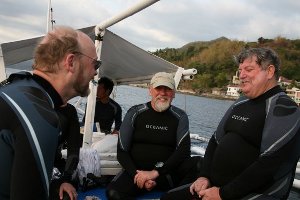 California Academy of Sciences biologists Dr. Terrence Gossliner, Dr. Bob Van Syoc, Dave Catania. Credit: David McGuire, SaeStewards.org
California Academy of Sciences biologists Dr. Terrence Gossliner, Dr. Bob Van Syoc, Dave Catania. Credit: David McGuire, SaeStewards.org
It is midnight. The warm tradewind wafts onto the bamboo balcony as the gentle surf of the Philippine Sea splashes against the breakwall. The stars rotate on their steady cartwheel across the sky and the palm trees rustle their refrain. It is a lovely, romantic melody and it goes unheard by our team.
On Day 5 of the California Academy of Science’s 2011 Philippine Biodiversity Expedition, we completed a night dive observing and collecting specimens on what is affectionately known as a “muck dive.” We aren’t talking a colorful coral reef resplendent with fish and other marine life. It’s a silty shallow site near a pier with rubble and the occasional plastic bag. But in this habitat are undescribed worms, new species of nudibranchs and other invertebrates.
The tired divers have disembarked the Bangkha, disengaged from their dive gear, scarfed down a meal of rice and chicken and trooped to their microscopes, petri dishes, bags, jars and journals. Upstairs the scientists are counting worm segments, sorting sponges and writing the last of the day’s logs, as we download footage, make edits, charge batteries and repair gear before the morning’s dive. Science is hard work, and so is field documentation. We are sore, sunburned and exhausted, yet there is a real sense of satisfaction that what we are doing is important. If we don’t understand what is in nature, how will we know how to protect it, or why should we even care?
